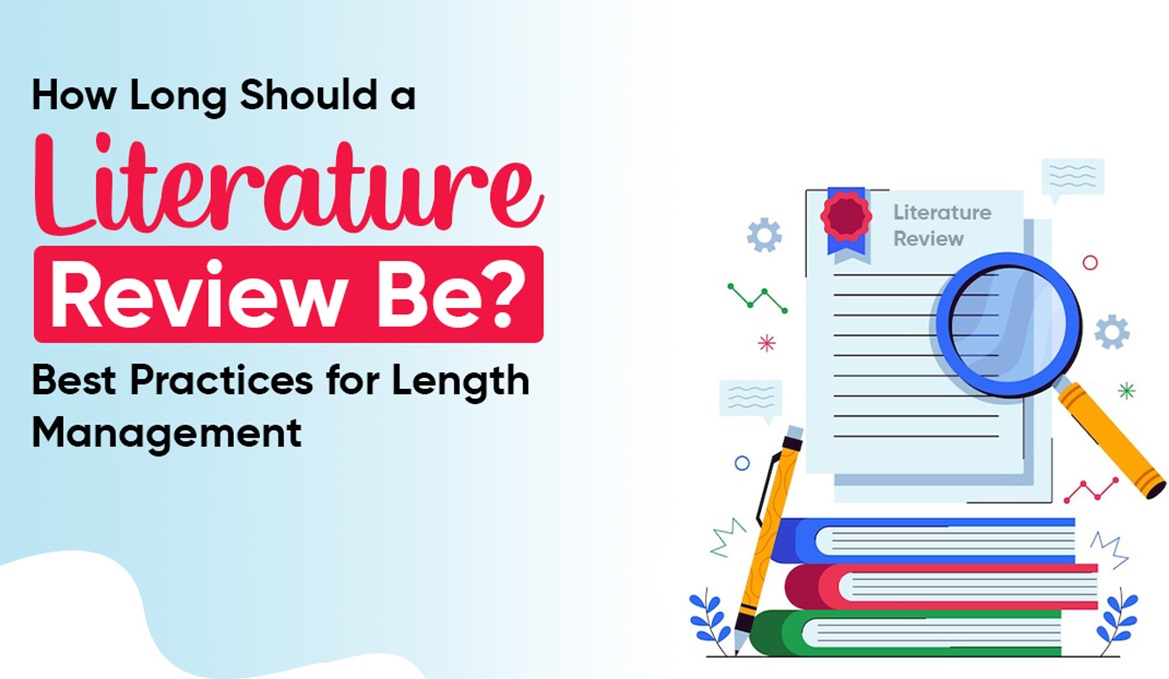
Writing a dissertation can be challenging, especially for students new to the process. Many students need clarification on various aspects, particularly in structuring and organising their content effectively. Among these uncertainties, one frequently asked question is: “How long should a literature review be?”
According to the University of Edinburgh, a literature review is an academic project that demonstrates a detailed comprehension of the existing literature on a given topic. It also includes a critical evaluation of the subject being studied.
This article covers in detail the key details and practical insights about the length of a literature review in a dissertation. Let’s dive deeper into the details.
How Long Is a PhD Literature Review?
As per the Discover PhDs, the approximate length of a literature review is usually 10-20% of the entire content. In PhD dissertations, most of the literature reviews range from 6000 to 12,000 words. The actual length depends on the research topic you are working on. Ideally, students should go for the quality over quantity approach when writing their papers.
The university guidelines on this topic can provide dissertation writing support to students. Hence, they must check the guidelines before writing the papers. Students can also ask the supervisors how long a literature review should be for further clarity.
6 Best Practices for Managing the Length of Literature Review for a Dissertation
A good literature review does not only summarise the sources, it also analyses, critically evaluates and synthesises the existing information. It shows you how you have examined the vastness of knowledge and can justify your research questions. Researchers also use different valuable tools to present a good summary of knowledge in the said field.
Moving on to further discussion, here are the best practices for managing the length of a literature review in a research paper.
Let’s explore those in detail.
1. Define the Topic You Will Review
The topic of your literature review must be identified and defined as clearly as possible. You will also need to have a clear idea of what you can review for effectively searching all the references. Presenting a coherent summary of research on the said topic is also important. Furthermore, students can discuss the topic, areas, and research questions they will review. An easy way to manage the length of your papers is by making a list of the relevant keywords and excluding the extra information.
This way, you will be able to determine the length of a literature review and manage it accordingly. You must define the topic in a way that makes the context of the research work crystal clear for all readers.
2. Conduct the Literature Search
Students should use a range of keywords to search for the data in different information storage systems. The presence of relevant articles can assist students in forming the basis of well-written literature reviews.
Published books can also be helpful, but you must keep in mind that peer-reviewed articles are considered the best for scientific research. To find relevant literature, you can also read articles, abstracts, and titles from sites like Google Scholar, JSTOR, and more.
The books from the university library can play an important role in the entire literature review session. Apart from that, you will be able to find out the relevant sources that can assist you in finding relevant research sources.
3. Read Through All the Research
At this stage, you should think about absorbing all the information that you possibly can. Read through all the books and articles that you have found, and don’t forget to take notes. These notes should have anything that can be helpful in advancing your thoughts about the topic. This strategy can assist you in writing an excellent literature review that addresses all the fundamental needs of your topic.
Some references may also turn out to be more interesting than they might appear in the beginning. So, you must not skip reading the related sources. Also, if you are not good at it before, try taking some note-making sessions.
4. Make an Outline
By this time, your ideas must be organised enough for you to sit down and make a detailed outline. First, reflect on all the reading you have done and carefully look for patterns.
See if there are unresolved questions around or if there is still a consensus. You can also look over your notes because it is easier to recognise them. Think about the ways you can use the research in the literature review.
The critical evaluation of the related knowledge can also be helpful. It will also help if you can outline the ways, you can structure your literature review. The outline must consist of the relevant elements of your entire dissertation.
5. Write the Literature Review and Edit It
The final stage of writing involves the full-fledged write-up of your papers. When working on the papers, keep in mind that the literature reviews work best with a summary style in which all the existing research is described sufficiently. The critical findings must be explained, but there should not be a high level of detail.
However, if you want to add extra detail for the readers, just mention some of the references. After you have crafted a first draft, read the full details and then edit the full information as needed. You may also have to repeat the process more than one time. Another good thing is to read through the drafts and provide feedback about it.
6. Incorporate The Review into Your Dissertation
After the literature review is complete, you should incorporate it into the research paper that you are working on. Writing a review is part of a large academic project. Depending on the stages where your paper is, you may also involve merging information into a partially full introduction section.
Crafting the rest of the paper apart from the literature review is comparatively easier because that is where you know how you can proceed with your papers. After adding it, do an overall revision session to check if the literature review aligns with the previous chapters. The existing body of knowledge should also be consistent with this chapter of your work.
Can a Literature Review Be 3 Pages?
As we have repeatedly said, the length of a literature review depends on its target readership and basic purpose. For most graduate dissertations and theses, a literature review is a full-fledged paper of at least 20 pages.
The number of pages and the word count is decided by the scope and depth of the topic that you are composing. Again, the final number of pages shall be decided by the structure you are supposed to follow.
How Long Should a Literature Review Be In a 10,000-Word Dissertation?
You might be wondering how long a literature review is supposed to be.Well, the guidelines by the university and your supervisors can answer this question really well. However, as a rule of thumb, the length of a literature review in a dissertation is up to 30% of the entire dissertation.
So, the length of a literature review for a dissertation of 10,000 words is approximately 3000 words. If you are wondering how we calculated this figure, then it is easy to understand because a literature review covers 20-30% of a dissertation.
Also Read: The Value of PSHE Lessons in Nurturing Well-Being and Personal Growth
Conclusion
We hope that your question of ‘how long is a literature review’ has been answered now. If you are struggling to find enough helpful material to add to this section, you can get in touch with the best dissertation writing companies in the UK. These services often have qualified and expert academic writers who know the ins and outs of academic research.
Finally, when you are finished writing your literature review section, it is time to review and proofread it fully. Paper editing is an important task and should be taken seriously by the students. So, after writing this part, you must check it in detail to see if you have missed anything or not.
All in all, you must incorporate the guidelines of your academic institute in the paper sections you work on. Your entire academic project needs to fulfil the guidelines and meet the stringent academic criteria.








